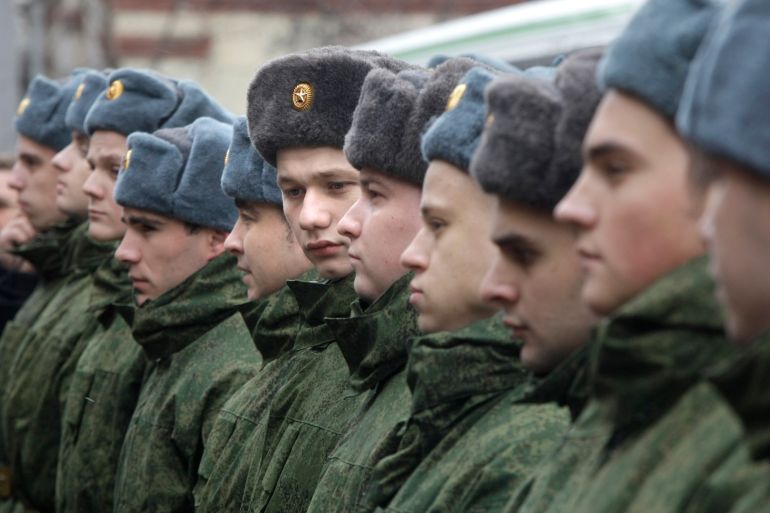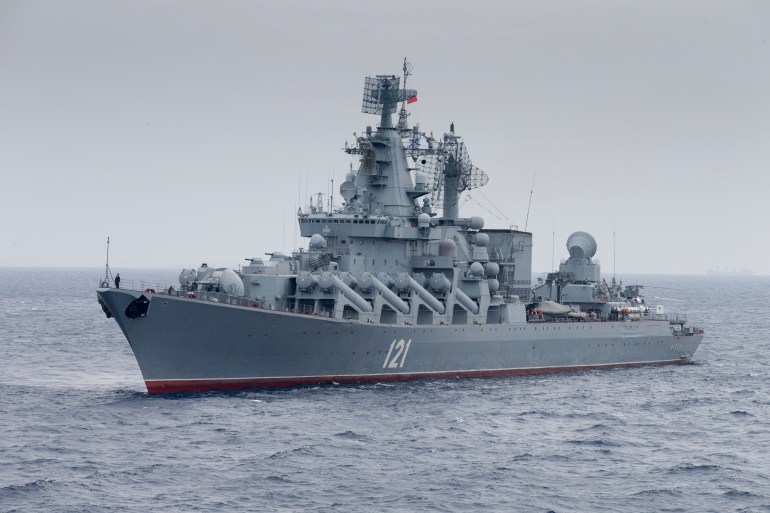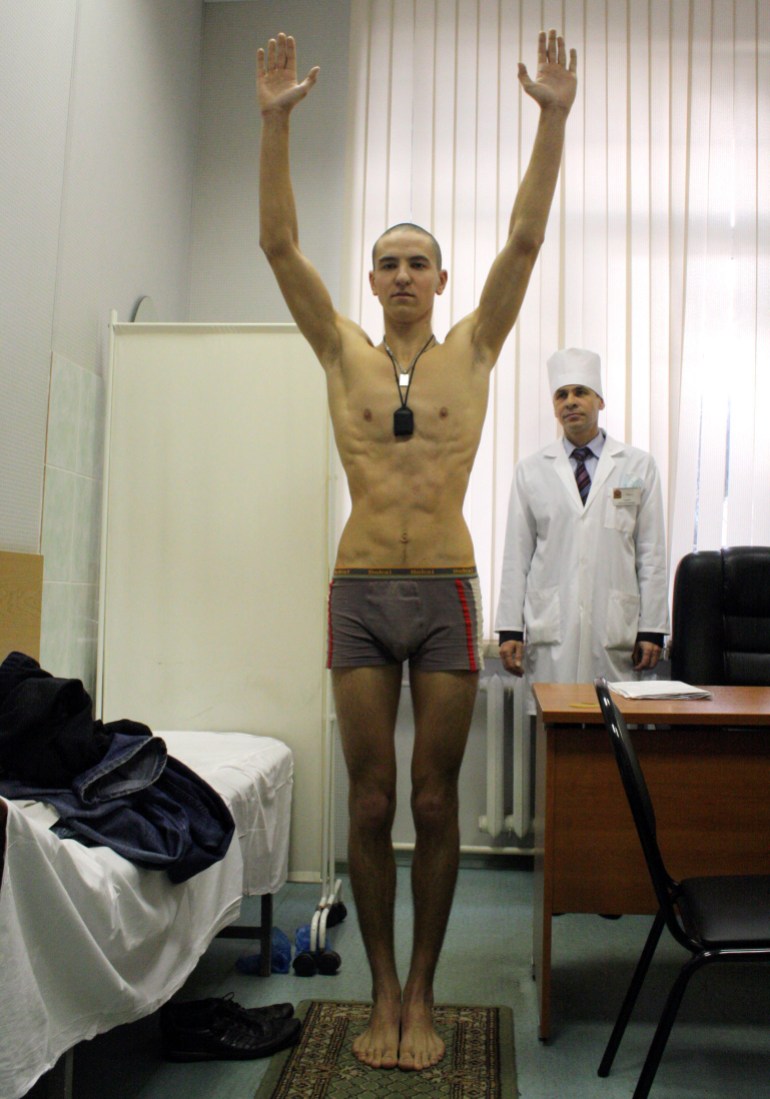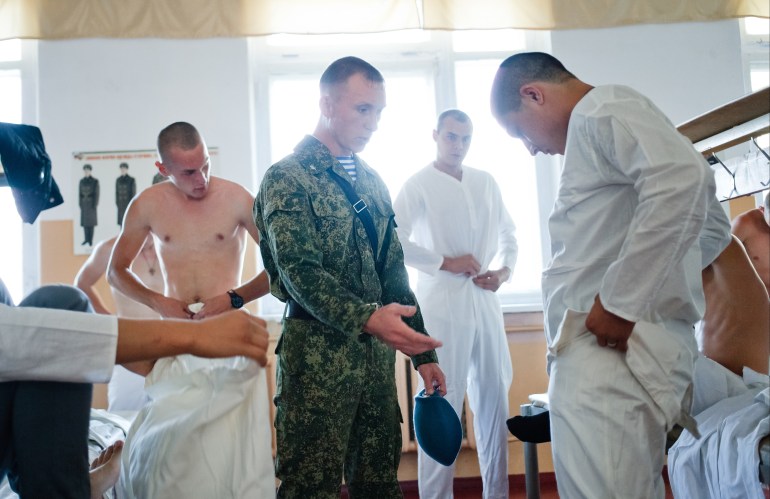Explainer: How does conscription work in Russia?
Spring conscription is under way in Russia, fuelling anxieties that young men will be sent to Ukraine’s front lines.

Names marked with an asterisk* have been changed to protect identities.
Russia’s annual spring military draft is under way, and with the war in Ukraine entering a third month, human rights advocates say pleas for help to avoid military service have increased.
Keep reading
list of 4 itemsFinland, Sweden to drop players from Russian hockey league teams
Russian theatre drops directors who spoke against Ukraine war
Evacuation of civilians from Ukraine’s besieged Mariupol delayed
On the first day of the spring conscription, which runs from April 1 to July 15, a government-issued disclaimer appeared in Russian news articles, offering families information on the nature of service: “Conscription events are not related to the special operation in Ukraine.”
The articles included a message of reassurance from Defence Minister Sergei Shoigu: “I would like to emphasise that conscripts will not be sent to any hot spots” – a euphemism for the war in Ukraine.
But many families remain sceptical and fear their sons may end up on the front of what Moscow has called a “special military operation” in Ukraine.
Those fears have been brewing for weeks.
Days before Russia began its invasion on February 24, an estimated 190,000 personnel were stationed around Ukraine’s borders.
At that time, the independent news website Meduza reported that conscripted soldiers had been forced to sign contracts that saw them sent to the Ukraine border. Some of the soldiers’ parents said they had not heard from their sons since.
In early March, after denying conscripts were being deployed in Ukraine, Russian senator Lyudmila Narusova told the country’s Federal Council she was aware of 100 young soldiers, mostly conscripts, who were forced to sign contracts to serve in Ukraine.
Only four were alive, she said.
Russia’s defence ministry then acknowledged that conscripts had participated in the conflict, with some taken prisoner by the Ukrainian army – but stressed remaining conscripts had been pulled out of the territory.
The Kremlin said Russian President Vladimir Putin had launched an investigation into the officials who disobeyed his orders to exclude conscripts from the operation.
But since then, reports suggest conscripts are still participating in the war.
After the sinking of Russia’s flagship Moskva in the Black Sea on April 14, Russian authorities said the entire crew had been evacuated. But Dmitry Shkrebets wrote on social media that his conscript son Yegor had been a cook on the ship, and was now listed as missing in action.
“A conscript who was not supposed to take part in hostilities is listed as missing,” he said in a post on VKontakte, Russia’s largest social network.

How does conscription work in Russia?
Russia has long relied on conscription to boost its armed forces.
In Soviet times, many young men did all they could to avoid it.
They not only feared being sent to war, but also the hazing rituals, known as dedovshchina (rule of grandfathers), for which the Red Army was notorious.
Under this informal system, senior soldiers subjugated, robbed and brutalised junior draftees while officers turned a blind eye.
Hazing still remains a problem today.
Conscription seasons run twice a year in Russia – from April 1 until July 15 (spring) and between October 1 and December 31 (autumn). During these periods, men aged between 18 and 27, with no health issues or outstanding convictions could be called on to serve.
Oleg Kuznetsov*, who is among a coalition of lawyers helping men resist conscription, said that with the war in Ukraine, calls to their hotline are 10 times higher than they usually are during conscription season.
“Not every person is obliged to serve in the army, only the ones who are conscripted. That’s about one-third of the generation,” Kuznetsov told Al Jazeera. “But the procedure is set up in such a way that they still call every young person to the military registration.”
After several checks, mostly medical, “some get conscripted and others don’t”, but because everyone has to go in “there’s a lot of stress”, he explained.

Failure to appear at the registration office is punishable by large fines and a two-year prison sentence.
The Institute for the Study of War estimates about 1.2 million men are eligible to be drafted each year, but only about 400,000 actually end up serving.
New conscripts undergo up to eight months of training before being sent to designated units.
Mandatory conscription lasts for 12 months, after which the soldiers can join Russia’s two million-strong military reserves.
The Russian army has historically used conscription to ensure they have reserves with military training, in case there is a need to mobilise for a major war.
But these days, mobilisation is limited to soldiers and sailors younger than 45 and officers younger than 55.
Under current laws, men who transferred to the reserve less than two years ago, fathers of three or more children, and those with criminal records are exempt from mobilisation.
How do men avoid military service?
There are several ways men can get out of service.
Legally, “the draft is limited to those whose state of health is recognised as fit”, Kuznetsov said, adding a medical commission has a long list of illnesses that preclude conscription.
He claimed that while “a great many people” are unfit for service, “the medical commission turns a blind eye and, just to fulfil the plan, they draft them anyway”.

Conscripts can also try to avoid active military service on moral grounds, by doing what is known as “alternative civil service”.
Article 59 of the Russian Constitution enshrines the right to undertake a different non-military form of national service if a young man’s “convictions or religious beliefs contradict military service”.
Conscripts can either work for 21 months at any “organisation subordinate to the bodies of the executive branch” – meaning they often end up in jobs such as nurses, cleaners and postal workers, or 18 months at a defence manufacturing plant.
According to the defence ministry, about 2,000 people apply for alternative civilian service each year and about half of them are approved.
However, this type of service carries a stigma in Russia, and many who apply are viewed as draft dodgers.
Kuznetsov says his main task is to create what he calls “grammatical conscripts” – men who know their rights under the law.
“A grammatical conscript becomes a headache for the military registration office. And eventually, they leave him alone and find someone else to take his place.”
Can conscripts be sent to war?
Despite Russia’s assurances, that conscripts are not being deployed to hotspots, Kuznetsov told Al Jazeera that the law does allow them to be sent to active war zones after four months of training.
“There are no norms that prevent sending conscripts to war,” he said. “But in Russia, this is very unpopular. This wasn’t popular during the Afghanistan war 50 years ago and in Chechnya 25 years ago. Therefore, the minister of defence and the president are reassuring the public, ‘No, no. Don’t worry. Nobody is going to send conscripts to war.’ But in actuality, what they say are just words.”
According to the Union of Committees of Soldiers’ Mothers, an NGO for soldiers’ rights, 14,000 soldiers died in the first Chechen war – at least half of whom were conscripts.
Since the war in Ukraine started, some men have fled the country to avoid military service.

A ‘professional’ army
In the wake of the 2008 Georgian conflict, Russia sought to modernise its army and move from a large force of low-skilled conscripts and reserves to a smaller, volunteer-based “professional army”, comprising mainly highly-trained contractors.
Since then, the number of professional soldiers has increased.
In 2019, Shoigu, the defence minister, told Russia’s parliament that since 2012, the number of contractors has nearly doubled, “currently reaching 394,000 people”.
“At the moment, from what I can see, the authorities are betting on contractors and think they can manage,” Kuznetsov said, adding Russia did not appear to be increasing its pool of conscripts.
In early April, the start of this year’s spring draft, the defence ministry said it aimed to recruit 134,500 men this season.
This is only a little higher than the 134,000 in the spring of 2021, and lower than the 135,000 in 2020.
Leonid Petrov, a visiting fellow and expert on Russian and Eurasian politics at the Australian National University, told Al Jazeera that motivation among conscripts – who are paid considerably less than contract soldiers – to fight in Ukraine is low, compared with those who have volunteered to serve.
“In general, Russian troops don’t have low morale,” Petrov said.
Professional army men are more likely to swallow the propaganda that “Ukraine is in a grip of Nazi monsters” and “Russians are among them, craving to be liberated”.
Conscripts, on the other hand, are more likely to surrender, he said.
According to Kuznetsov, while the conscription system appears to be largely running as normal, it is hard to predict what could emerge in the future.
“It’s very frightening that the leadership of Russia is destroying all norms and laws,” he said. “You can say that Putin has lost his mind and lives in his own reality. The whole country depends on the opinion of one person.”